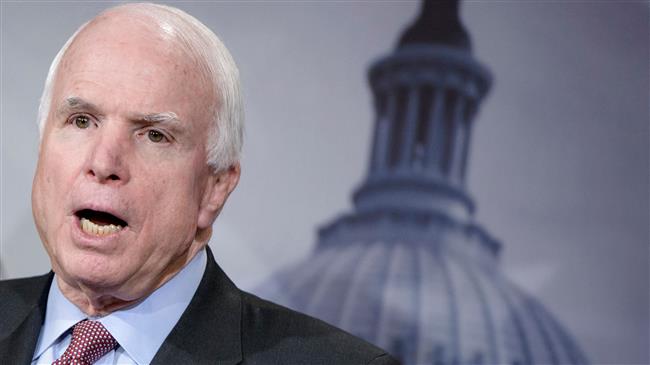Hawkish US Republican Senator John McCain dead at 81
Hawkish US Republican Senator John McCain of Arizona, infamously known for backing US-led wars in Iraq and Afghanistan as well as supporting foreign-backed terror groups in Syria, has died at the age of 81.
McCain’s office announced in a Saturday statement that "Senator John Sidney McCain III died at 4:28 p.m. on August 25, 2018." The former US presidential candidate, Vietnam war veteran and prisoner of war had declared back in July 2017, that he had been diagnosed with a glioblastoma, an aggressive type of brain tumor.
The development came after McCain’s family announced earlier in the week that he was discontinuing treatment.
"With the Senator when he passed were his wife Cindy and their family. At his death, he had served the United States of America faithfully for sixty years," McCain's office said in the statement.
In his 36 years in Congress, McCain became one of the country's most influential politicians. Last year, in his last act of defiance against his party and US President Donald Trump, McCain returned to the Capitol less than a week after his cancer was diagnosed to cast his vote on the Republican effort to repeal the Affordable Care Act — the biggest legislative achievement of President Barack Obama, the man who defeated him in the 2008 election.
But in recent months, the man who had been a mainstay on Capitol Hill for more than three decades was noticeably absent.
McCain was first elected to office in 1982, when he won a seat in the US House of Representatives from Arizona. Four years later he was elected to the Senate, and he was re-elected five times.

Back in the Senate, McCain heard the call of war again, as American foreign policy was transformed after the September 11, 2001, terror attacks, and he became a forceful proponent of the US use of force overseas.
He backed US interventions in Afghanistan and Iraq. Even when Americans grew tired of war, McCain warned that more troops were needed, demanding a surge in forces that Bush later adopted.
But, influenced by his experience of torture in Vietnam, the Arizona senator was a forceful critic of the so-called enhanced interrogation techniques – or torture -- used by the CIA on terror suspects, believing they were contrary to American values and damaged the US image abroad.
Even as McCain is mourned, attention will also soon turn to the process for replacing him in the Senate— where he spent so much of his career.
Arizona Gov. Doug Ducey, a Republican, is legally required to fill vacancies in Arizona’s US Senate delegation and will therefore appoint McCain’s replacement. Whoever Ducey chooses will stay in office until 2020.
The governor has so far remained silent on who he has in mind out of respect for McCain and his family. By Arizona state law, he must tap someone of the same party as McCain — meaning a Republican — and he has ruled himself out.
After McCain’s announcement on Friday, Ducey lauded the ailing senator as an “American hero” who has always put the country before himself. “From Vietnam to the halls of the US Senate, the spirit of service and civility that has guided Sen. McCain’s life stands as a model for all Americans, regardless of political affiliation,” he said.
McCain’s junior colleague, Republican Senator Jeff Flake, has already announced that he is retiring, meaning both of Arizona’s Senate seats would have been up for grabs.
Hezbollah offers condolences to Iranian nation over Leader’s martyrdom
US-Israeli strike targets IRIB facility; broadcasts continue
IRGC: Latest waves of Op. True Promise 4 led to tanker strikes, base shutdowns, heavy casualties
CENTCOM confirms US troops killed in Iran’s retaliatory strikes
China ‘strongly condemns’ US-Israeli assassination of Iran’s Leader
Iran sees no limits in defending itself after Leader's ‘dangerous’ assassination: FM
IRGC strikes USS Abraham Lincoln aircraft carrier with volley of ballistic missiles
Iranian armed forces to pulverize US bases across the region: Pezeshkian













 This makes it easy to access the Press TV website
This makes it easy to access the Press TV website